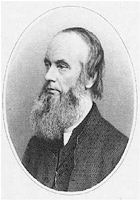Henry Alford Biography
Henry Alford (October 7, 1810 – January 12, 1871) was an English churchman, theologian, textual critic, scholar, poet, hymnodist, and writer.
Alford was a talented artist, as his picture-book, The Riviera (1870), shows, and he had abundant musical and mechanical talent. Besides editing the works of John Donne, he published several volumes of his own verse, The School of the Heart (1835), The Abbot of Muchelnaye (1841), The Greek Testament. The Four Gospels (1849), and a number of hymns, the best-known of which are "Forward! be our watchword," "Come, ye thankful people, come," and "Ten thousand times ten thousand." He translated the Odyssey, wrote a well-known manual of idiom, A Plea for the Queen's English (1863), and was the first editor of the Contemporary Review (1866–1870).
His chief fame rests on his monumental edition of the New Testament in Greek (4 vols.), which occupied him from 1841 to 1861. In this work he first produced a careful collation of the readings of the chief manuscripts and the researches of the ripest continental scholarship of his day. Philological rather than theological in character, it marked an epochal change from the old homiletic commentary, and though more recent research, patristic and papyral, has largely changed the method of New Testament exegesis, Alford's work is still a quarry where the student can dig with a good deal of profit.
His Life, written by his widow, appeared in 1873 (Rivington).
My hand is lonely for your clasping, dear;
My ear is tired waiting for your call.
I want your strength to help, your laugh to cheer;
...
Again the solemn season--and again
That bleeding Brow, those wounded Hands and Feet--
Again that piercèd Side my vision meet;
...
Here are the brows of Quantock, purple--clad
With lavish heath--bloom: there, the banks of Tone.
Where is that woman, love--forlorn and sad,
...
Tell me, thou mild and melancholy bird,
Whence learnedst thou that meditative voice?
For all the forest--passages rejoice,
...
Saviour of them that trust in Thee,
Once more, with supplicating cries,
We lift the heart and bend the knee,
And bid Devotion's incense rise.
...
